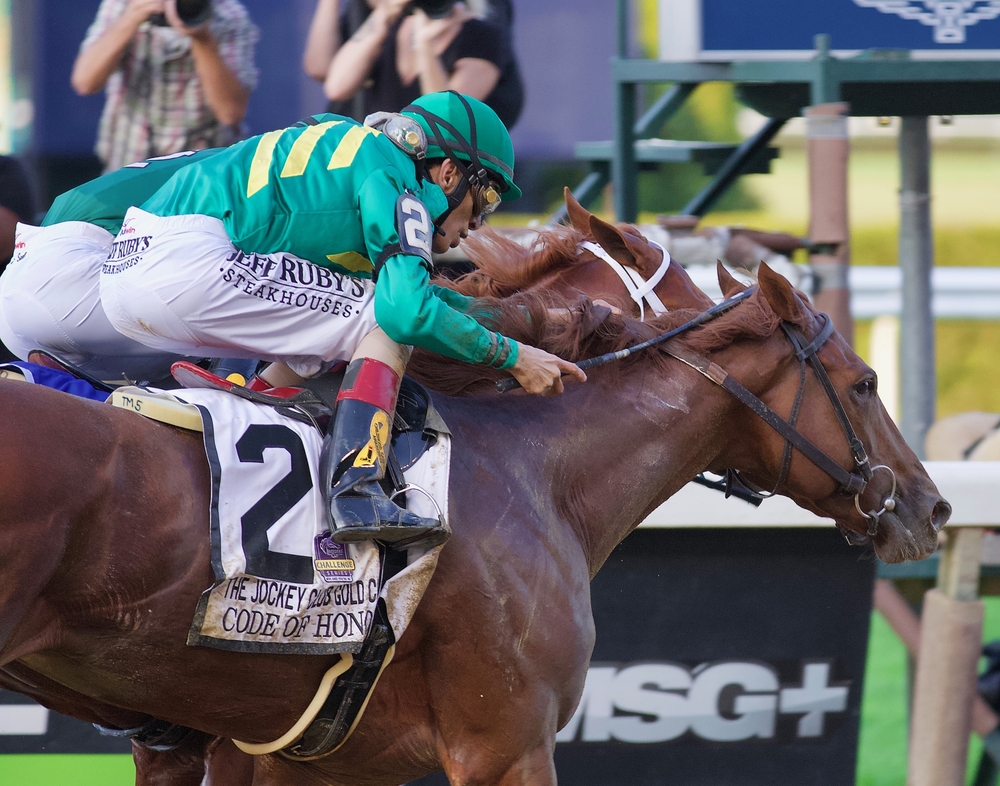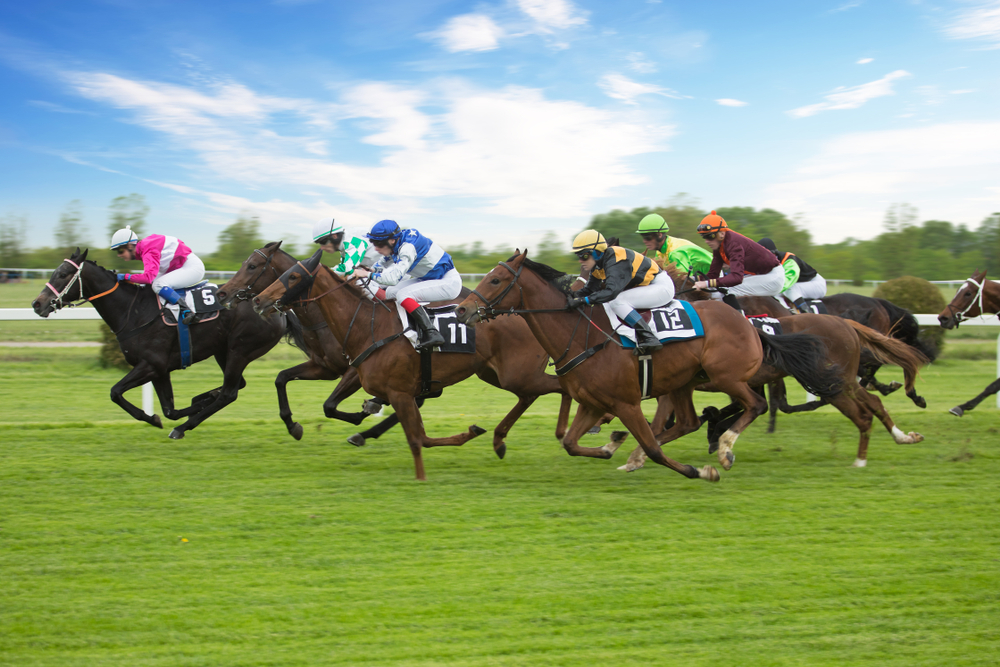An each way double is a popular bet in which you can make a profit if your two selections either win or place. Horse racing is the most common sport that punters have each way doubles on, while golf and tennis are other popular sports for each way doubles.
Keep reading our article to find out how to place an each way double, how each way doubles work, how to work out your winnings from an each way double, and some examples of each way doubles.
How To Place An Each Way Double
You can place each way doubles at most high-street bookmakers and on online betting sites. All you need to do is pick two selections that you want to combine in an each way double. If you’re betting in a high-street bookmaker’s shop, make sure you write each way double at the top of your betting slip and write your two selections underneath. Then add your stake, for example, £5 each way, which will cost you £10.
If you want to place your each way double online, add your two selections to your electronic bet slip and then choose the double option. Tick the each way box and add your stake.
How An Each Way Double Works
When you place an each way double, there are three possible outcomes, with the best one being that both of your selections win. This means you will collect both the win part and the place part of your each way double.
The second possible outcome is that both of your selections at least place, meaning you will win the place part of your each way double. Even if one of your selections wins and the other one places, you will still only win the place part of your bet.
The third possible outcome is you will lose your bet if at least one of your selections fails to place. It doesn’t matter whether both fail to place, one places and loses, or one wins and one loses, you will still lose your bet.
How To Work Out Your Winnings From An Each Way Double
As we’ve already mentioned, there are three possible outcomes from an each way double. Let’s highlight this with an example of a £10 each way double on two horses priced at 8/1 (place terms ¼ odds) and 10/1 (place terms 1/5 odds).
If both these horses win, you will win both the win and place parts of your each way double.
A £10 win double at 8/1 and 10/1 = a return of £990
A £10 place double at 2/1 (¼ of 8/1) and 2/1 (1/5 of 10/1) = a return of £90
Total return = £1080 and a profit of £1060.
If both horses place or one wins and one places, you will only win the place part of your each way double.
As above, the £10 place double returns £90, for a profit of £70.
If at least one horse loses, you will lose £20.
Horse Racing Each Way Doubles
Horse racing each way doubles are popular with many punters, while some professional horse racing tipsters have also been known to specialize in this type of bet.
Doubles give you the chance to bank some big wins if you can pick two big-priced selections. However, some punters also use each way doubles to combine selections that you wouldn’t normally bet on each way.
For example, you wouldn’t normally bet each way on a horse at odds of 5/2, but it can be worth combining two horses at 5/2 in an each way double.
A £10 win double at 5/2 and 5/2 = a return of £122.50
A £10 place double at 1/2 (1/5 of 5/2) and 1/2 (1/5 of 5/2) = a return of £20.
Total return = £142.50 and a profit of £122.50.
If both horses place or one wins and one places, you will only win the place part of your each way double. As above, the £10 place double returns £20, meaning you break even. You couldn’t have backed these two horses in each way singles and won, but the place part of your bet has at least got you your money back.
Golf Each Way Doubles
Golf each way doubles are one of the holy grails of each way betting, but many punters try and land them because of the potentially huge rewards. There are normally at least two golf tournaments taking place most weeks, whether that’s PGA Tour, European Tour, LPGA Tour, or Seniors Tour.
Golf is renowned for producing more 100/1+ winners than any sport, but even landing the place part of an each way golf double at those odds is very rewarding. The enhanced place terms that many bookmakers now offer also means you’ve got a much better chance of winning the place part of these types of bets.
Imagine having a £10 each way golf double on two golfers at 100/1, at 1/5 odds a place.
A £10 win double at 100/1 and 100/1 = a return of £102,010
A £10 place double at 20/1 ad 20/1 = a return of £4,410
As you can see, the returns are potentially life-changing, but even the place part will pay for a nice holiday.
Tennis Each Way Doubles
Tennis each way doubles are a little trickier than golf doubles, as most bookmakers only bet ½ odds 2 places in tournaments. But if you fancy two players will at least reach the finals of different tournaments that are taking place in the same week, you can combine them in an each way double. Tennis has been known to produce its fair share of big-priced winners, especially in the lower-class events in which some of the better players aren’t that motivated.
What Is An Equally Divided Double?
If you like each way doubles but find that you have an annoying habit of picking one winner and one placed horse, then an equally divided double might be for you. An equally divided double places an each way bet on your first selection and then divides any return from that bet onto your second selection. You will still need both selections to place to get a return, but these returns will be very different from an each way double.
Let’s highlight this with an example of a £10 equally divided double on two horses priced at 8/1 (place terms ¼ odds) and 10/1 (place terms 1/5 odds).
There are four possible ways to get a return from an equally divided double:
Horse A and Horse B both win
Horse A wins and Horse B places
Horse A places and Horse B wins
Horse A and Horse B both place
If horse A wins at 8/1, the return will be £120. This is then equally divided into a £60 each way bet on Horse B.
If Horse B wins at 10/1, you’ll get a return of £840.
If Horse B places, you’ll get a return of £180
If Horse A places, you’ll have a return of £30, which will then be equally divided into a £15 each way bet on Horse B.
If Horse B wins, you’ll get a return of £210.
If Horse B places, you’ll get a return of £45.
If you compare these returns to those from our each way double example, you can see that you would be better off if you have one winner and one place, but worse off if you have two winners or two places.
If you’re not sure whether to have an each way double or an equally divide double, there is always the option to have half your stake on each.
Can I Cash Out Each Way Doubles?
Many bookmakers that offer cash-out options will provide you with a cash-out offer on horse racing each way doubles after your first selection has run, providing there is enough time between races to do so.
Cash-out offers should always be considered, but you probably need to ask yourself why you placed a double in the first place if you are going to cash out after the first single.
One scenario that you might want to consider cashing out is if you’ve placed an each way double thinking that both horses will place but your first selection wins. The cash-out offer may now be more than what the place part of the each way double will pay, so you might want to cash out if you think your second selection will only place at best.
Should I Have Each Way Doubles?
While some professional gamblers regularly provide tips for each way doubles, there are more that don’t, which probably tells you that they’re not easy to land.
But that shouldn’t put you off having an each way double if you fancy two horses at good prices strongly. You may also want to place two singles, in case only one wins, but the choice is yours.
If you love watching golf and dream of landing that life-changing bet, golf each way doubles can be fantastic entertainment. However, as they are so difficult to land, you’ll need to be careful with your bankroll management.
If you decide to have each way double bets, keep a check of how much money you win or lose. Also, work out if you’d have done better placing single bets on all your selections.
FAQs
What happens in an Each Way Double with a non-runner?
An each way double with a non-runner simply becomes a single each way bet on the one remaining selection.
Is an each way double a good bet?
Whether an each way double is a good bet or not depends on several factors including your overall betting strategy, risk tolerance, and knowledge of horse racing. As with all forms of gambling, it’s important to only bet what you can afford to lose, and to stop when the fun stops.
Is it best to bet each way in horse racing?
Whether to bet each way in horse racing depends on several factors including field size, odds, risk tolerance, and your betting strategy. Each way betting can be advantageous in races with larger fields and higher odds, as it allows for returns even if your horse only places. However, each way bets double your stake, which increases risk. The best approach depends on your confidence in picking winners and your overall betting strategy. As always, bet responsibly and only what you can afford to lose.
How do you calculate each way double bet?
An each way double bet consists of two each way bets placed on different races in which the stake and winnings from the first each way bet fund the stake on the second bet. With each way bets, your stake is always doubled, as you are technically backing two different scenarios within the same bet. You will receive a larger payout if the actual Win side of the bet is a winner, but you will still receive some payout if only the Place side is a winner. To calculate the returns on an each way double bet, you can use an each way bet calculator like the one provided by OddsMonkey.
How does an each way bet work if you win?
If your selection wins the race in an each way bet, you will receive a payout for both the win and place parts of your bet. The amount you receive for the win part of the bet will be calculated based on the odds of your selection winning the race, while the amount you receive for the place part of the bet will be calculated based on the odds of your selection finishing in one of the predetermined places, which can vary depending on the number of runners in the race. The place portion of the bet typically pays out at a fraction of the win odds, with the exact fraction depending on the bookmaker and the number of runners in the race. For example, if you placed a £10 each way bet on a horse at odds of 10/1 and it won the race, you would receive a payout of £110 (£10 at 10/1 for the win portion and £10 at 1/4 of 10/1 for the place portion).






What happens when one is a non runner.
A double consists of two selections, if one is a non-runner then your bet becomes a single.